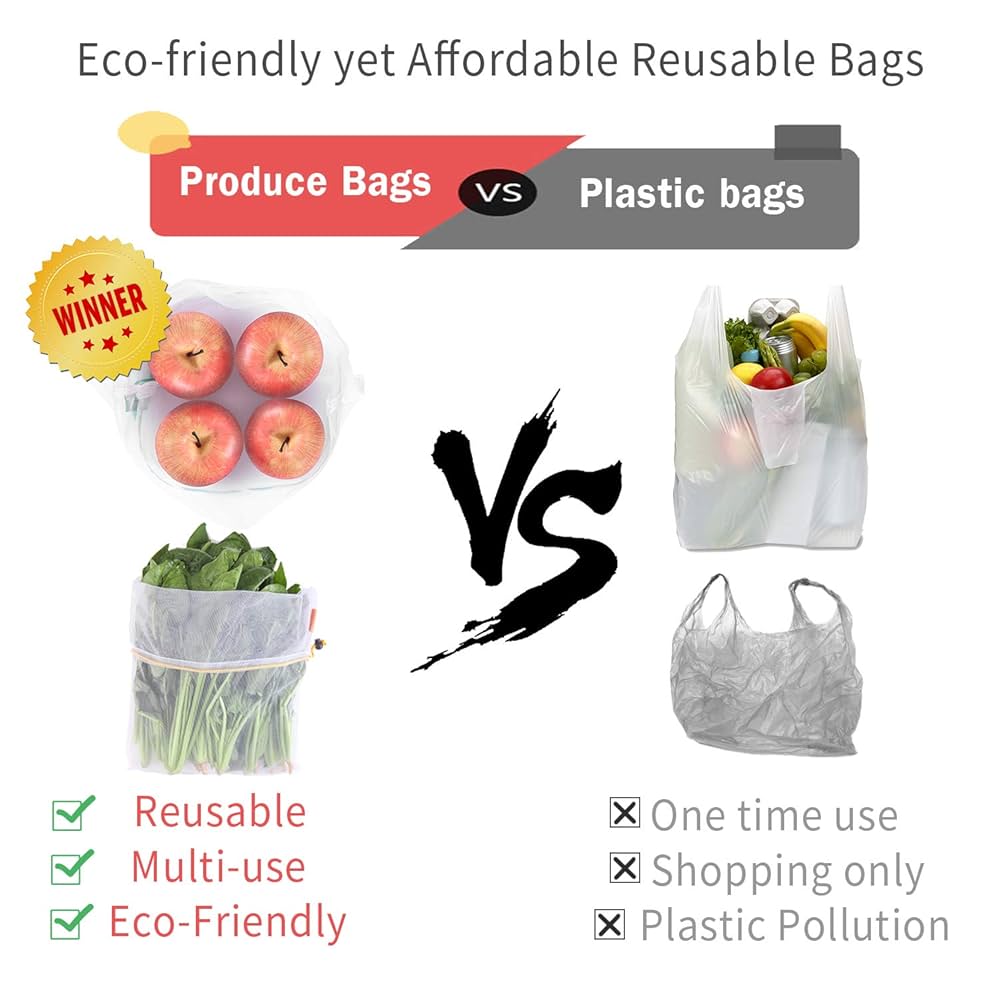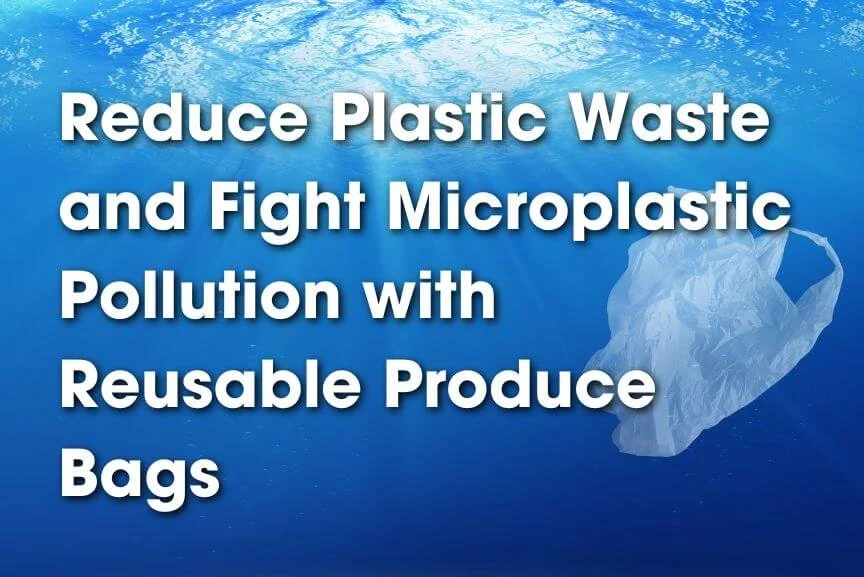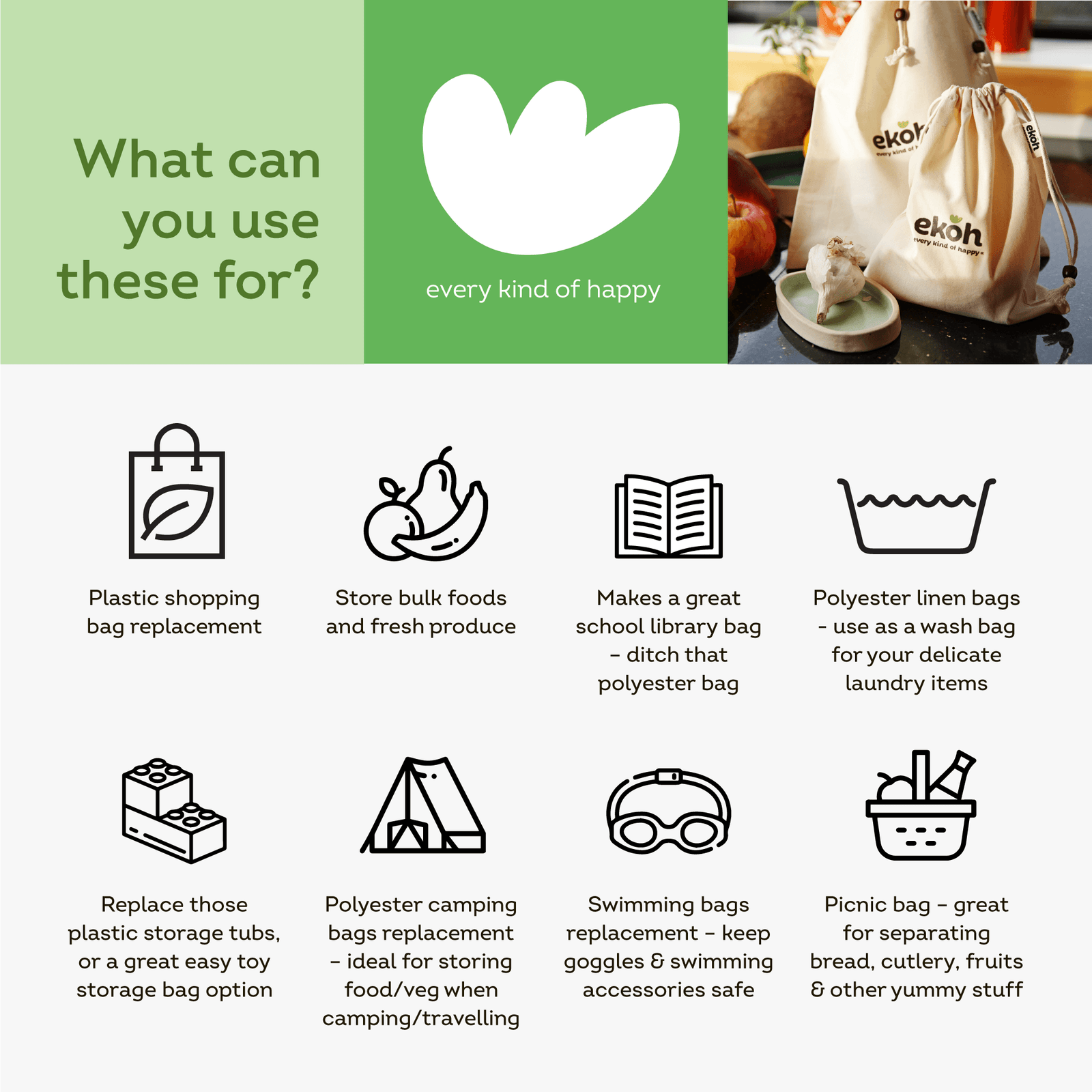Are you ready to make your grocery shopping greener and easier? Using reusable produce bags is a simple change that can save you money, reduce plastic waste, and keep your fruits and veggies fresh longer.
But to get the most out of these bags, there are a few smart tips you should know. Keep reading, and you’ll discover how to use your reusable produce bags like a pro—making your shopping trips smoother and better for the planet.
Choosing The Right Bags
Reusable produce bags help reduce plastic waste. Picking the right ones is important for your needs.
Consider factors like material, size, and durability. These will ensure you get the best bags for your shopping.
Material Options
Different materials suit different needs. Choose the one that fits your lifestyle.
- Cotton is soft and washable.
- Mesh is great for breathability.
- Nylon is strong and lightweight.
Size And Shape
Bags come in various sizes and shapes. Select what fits your shopping habits.
- Small bags are good for herbs.
- Medium bags hold fruits and vegetables.
- Large bags carry bulk items.
Durability Factors
A durable bag lasts longer and saves money. Check for strong seams and handles.
- Double-stitched seams add strength.
- Reinforced handles carry heavy loads.
- Machine washable bags keep them clean.

Credit: www.amazon.com
Preparing Bags For Use
Reusable produce bags help reduce plastic waste. Before using them, it is important to prepare them properly.
Preparing bags ensures they are clean and easy to organize at the store. This makes shopping faster and safer.
Cleaning Before First Use
Wash your reusable produce bags before using them for the first time. This removes dust and germs from packaging.
Use warm water and mild soap. Rinse well and let the bags dry completely before use.
- Hand wash or use a gentle machine cycle
- Avoid harsh detergents or bleach
- Air dry to keep bag shape
Labeling For Organization
Label your bags to keep fruits and vegetables organized. This helps you find items quickly when shopping.
You can use tags, stickers, or fabric markers to mark each bag with the type of produce it holds.
- Write the name of the produce on the bag
- Use different colors for different types
- Make labels easy to read and remove if needed
Packing Tips For Fresh Produce
Using reusable produce bags helps reduce plastic waste. It also keeps your fruits and vegetables organized.
Packing fresh produce correctly keeps it fresh longer. This guide shares simple tips for better packing.
Sorting By Type
Sort produce by type before packing. Keep fruits and vegetables separate to avoid damage.
Grouping similar items helps prevent bruising and spoilage. It also makes unpacking easier.
Avoiding Overpacking
Do not overfill your reusable bags. Overpacking can crush delicate produce like berries and leafy greens.
Leave space for air circulation. This helps keep the produce fresh and prevents mold growth.
Keeping Produce Fresh
Use breathable reusable bags for fruits and vegetables. Breathable bags reduce moisture buildup inside.
Store bags with produce in a cool, dry place. Keep them away from direct sunlight to extend freshness.

Credit: www.envireusablebags.com
Cleaning And Maintenance
Reusable produce bags help reduce plastic waste. Keeping them clean is important for food safety.
Good care keeps bags fresh and lasts longer. Follow simple steps to clean and maintain them well.
Washing Methods
Wash reusable produce bags regularly to remove dirt and bacteria. Use gentle washing methods to protect the fabric.
- Hand wash with mild soap and warm water
- Machine wash on a gentle cycle with cold water
- Avoid bleach or harsh detergents that damage fabric
- Rinse bags thoroughly to remove all soap
Drying Tips
Dry bags completely after washing to prevent mold and odors. Use natural drying methods when possible.
- Hang bags in a well-ventilated area
- Lay flat on a clean towel for even drying
- Avoid using a dryer to protect bag shape and material
- Ensure bags are fully dry before storing
Storing Properly
Store reusable produce bags in a clean, dry place. Proper storage keeps bags ready for use and free from germs.
- Keep bags in a breathable container or basket
- Avoid sealed plastic bags to prevent moisture build-up
- Store away from direct sunlight and heat sources
- Separate clean bags from used ones to avoid cross-contamination
Maximizing Eco Benefits
Using reusable produce bags helps reduce waste and protect the environment. You can make a bigger impact by using them wisely.
Simple habits can make these bags last longer and cut down on plastic use even more.
Reducing Plastic Waste
Reusable produce bags replace single-use plastic bags at stores. This lowers the amount of plastic thrown away.
Choose bags made from natural or recycled materials for less harm to the planet.
- Bring bags to the store every time
- Use mesh or cotton bags instead of plastic
- Wash bags regularly to keep them clean
Reusing Beyond Produce
Reusable produce bags can hold more than fruits and vegetables. Use them for other items to reduce waste.
You can store toys, small laundry items, or even carry snacks in these bags.
- Use bags for bulk food shopping
- Store craft supplies or small tools
- Keep travel items organized
Encouraging Others
Share your reusable bag habits with family and friends. This helps spread eco-friendly ideas.
Show others how easy it is to reduce plastic waste by using reusable produce bags.
- Gift reusable bags to loved ones
- Talk about benefits at community events
- Lead by example when shopping
Troubleshooting Common Issues
Reusable produce bags are great for the environment. Sometimes they get stains, smells, or small damage. You can fix these problems easily.
Knowing how to clean and care for your bags helps them last longer. Here are some tips to handle common issues.
Dealing With Stains
Stains happen from fruits, vegetables, or dirt. Clean stains quickly to stop them from setting. Use gentle washing to protect the bag’s fabric.
Try soaking the bag in warm water with mild soap. Rub the stain softly with a cloth or soft brush. Avoid strong chemicals that can damage the bag.
- Soak in warm water and mild soap for 15 minutes
- Gently scrub stains with a soft brush or cloth
- Rinse well and air dry completely
- Do not use bleach or harsh detergents
Handling Odors
Bags can smell from food or moisture. To remove odors, wash the bags often. Let them dry fully before storing to stop smells.
If odors remain, try using baking soda. Sprinkle some inside the bag and leave it overnight. Baking soda absorbs bad smells naturally.
- Wash bags after each use with mild soap
- Dry bags completely before storing
- Use baking soda inside bags overnight for odors
- Air bags outside in sunlight to freshen
Repairing Damage
Small tears or holes can happen from sharp produce or wear. Fix these quickly to keep bags usable. Sewing is the best way to repair damage.
Use a needle and strong thread to sew holes closed. If you do not sew, use fabric glue as a temporary fix. Replace bags if damage is too large.
- Sew small holes with needle and strong thread
- Use fabric glue for quick, temporary fixes
- Check bags regularly for damage
- Replace bags if holes are too big or growing

Credit: www.allcottonandlinen.com
Frequently Asked Questions
What Are Reusable Produce Bags Made Of?
Reusable produce bags are usually made from cotton, mesh, or recycled materials. These eco-friendly bags replace single-use plastic bags, reducing waste and pollution. They are lightweight, durable, and washable, making them perfect for carrying fruits and vegetables.
How Do I Clean Reusable Produce Bags?
Clean reusable produce bags by hand washing or machine washing on gentle cycles. Use mild detergent and air dry to maintain the bag’s shape. Regular cleaning prevents bacteria buildup and keeps your produce fresh and safe.
Can Reusable Produce Bags Hold Wet Or Damp Produce?
Yes, reusable produce bags can hold wet produce, but ensure they dry completely afterward. Moisture can cause mold or odors, so air drying is essential. Some bags are designed with water-resistant materials for better moisture control.
Are Reusable Produce Bags Safe For All Types Of Produce?
Reusable produce bags are safe for most fruits and vegetables. However, avoid storing very heavy or sharp items that might tear the bag. Using separate bags for different produce helps prevent cross-contamination and keeps your groceries organized.
Conclusion
Reusable produce bags help reduce plastic waste every time you shop. Choose bags that are strong and easy to clean. Carry them in your bag or car so you never forget. Wash bags regularly to keep fruits and veggies fresh.
Small changes add up to a big difference for the planet. Start using reusable bags today and feel good about your choices. Simple steps lead to a cleaner, healthier world for everyone.
